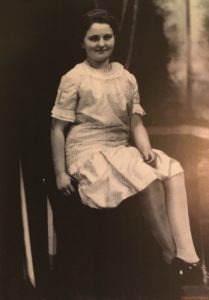
As with all journeys, this one originated somewhere, and I would be remiss if I failed to acknowledge the original Heroine of History, the woman who instilled in me the beauty of true kindness and humility. I have never featured her story because I have no corroboration of the events. I have only the stories passed down to me. My attempts to find official documentation have largely come up empty. Regardless, I would like to relate to you, the story, as I know it, of the original Heroine of History: Grace Elizabeth Bradshaw. This is in your honor.
After the bombing of Pearl Harbor, Americans lined up in droves to enlist in the armed forces to defend our country. While the majority of these new recruits were men, women felt the call of duty as well and stepped up to the plate. Grace Elizabeth Bradshaw – called Elizabeth or Beth by any who wanted to stay on speaking terms with her – was one such woman. She presented herself to the Army Nursing Corps and was enlisted as a lieutenant. Lieutenant Bradshaw, with a cadre of nurses in her charge, shipped out with the first wave of soldiers to Europe.
During the crossing, they were given their instructions. The transport ships carrying the soldiers would pull into shallow waters, at which point the soldiers would disembark and storm the beach. The medical personnel would wait in deeper waters, out of the range of gunfire, until the soldiers had taken the beach. Then the transports carrying the medical personnel would pull into shallower water, where they would jump out into the ocean and make their way to shore to help the wounded.
For Beth, this was a terrifying prospect, since she was deathly afraid of water. However, when the time came, she jumped in without a word and led her nurses to shore, because what was waiting for them on Omaha Beach was far more pressing than her fear of water.
After caring for the wounded as best they could, her unit moved inland, following the army across Europe, never far behind the front lines. They quickly discovered that German soldiers had a penchant for speeding by American tanks and throwing grenades inside as they passed. It was the job of Beth’s unit to follow along behind, pull the men out of the tanks, and try to save as many as they could. Due to the sheer number of burn victims they treated, her unit helped pioneer the techniques and procedures that would eventually become skin grafting.
As challenging as these tasks were, they didn’t face their biggest test until the Battle of the Bulge. Due to miscommunications and poor planning amongst both the allies and the axis, Beth’s unit had been instructed to erect their medical tent in what would become the middle of a battlefield. As the battle raged on around them, her unit never faltered in treating the wounded. Injured soldiers who still had a modicum of mobility crawled or drug themselves into the tent to be treated.
Those who couldn’t move screamed for help to come to them. Unable to stand by and listen to the screams any longer, Beth and one of the surgeons got into one of the medevac jeeps and drove out into the battle. They loaded it up with as many injured men as they could and drove back to the medical tent. As soon as they had beds available again, they went back out into the melee to retrieve more men. They continued to do this until the battle had subsided and other personnel were available to take up the task.
When the worst of it was over, and they all had a moment to breathe, Beth’s commanding officer called her into his tent. Once inside, she was upbraided for her reckless conduct and reminded of the responsibility she had to all of the nurses that served below her. Once she had promised that she would never do anything so reckless again and be more mindful of her responsibilities, he awarded her with a Bronze Star for heroic service.
Before the end of the war, Beth was also awarded with a Purple Heart. However, that award she tried to refuse, because her injury came from a hospital accident and she felt ashamed to be awarded for an accident when there were men who had been severely maimed being given the same medal. She only accepted it after her commanding officer ordered her to do so.
After VE Day, Beth’s unit stayed in Europe to help coordinate the evacuation of the remaining wounded soldiers. With the new peace also came the liberating freedom of time off and the ability to enjoy the occasional night out. Correspondence with family and friends back in the States also became easier.
When Beth’s sister asked if there was anything that Beth wanted sent, she asked her sister to send along Revlon Red nail polish, because she and the girls were planning a night out on the town and they wanted to feel like women again. Upon her return to the States and her discharge from active duty, Beth was promoted to the rank of Captain.
Beth settled in Colorado Springs, CO, where she married a mechanic and raised a family. She was well known at the Air Force Academy, where she taught first aid and CPR classes. She rarely spoke of her time in the war, and at one point gave her medals away because she felt that it was disgraceful that she had the same awards as those given to the boys that she had sent home with such grievous injuries. Beth passed away in 1993, and was survived by her four children and two grandchildren.
Grace Elizabeth Bradshaw Michels, this is in your honor. I am privileged to have loved and called you Grandma. May you never again be without Revlon Red nail polish.
